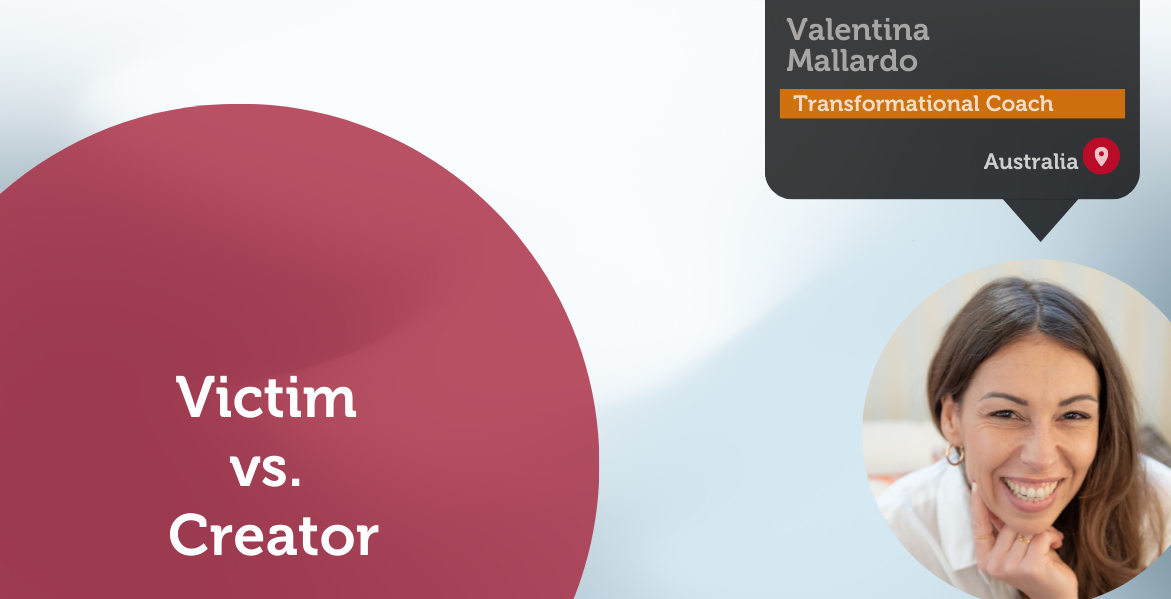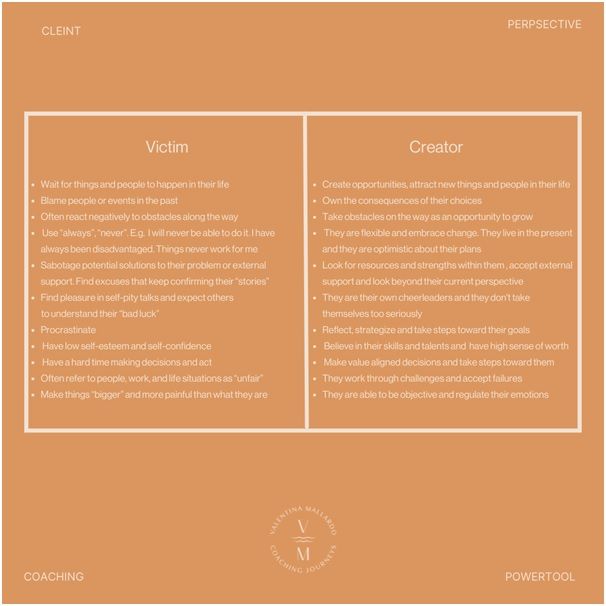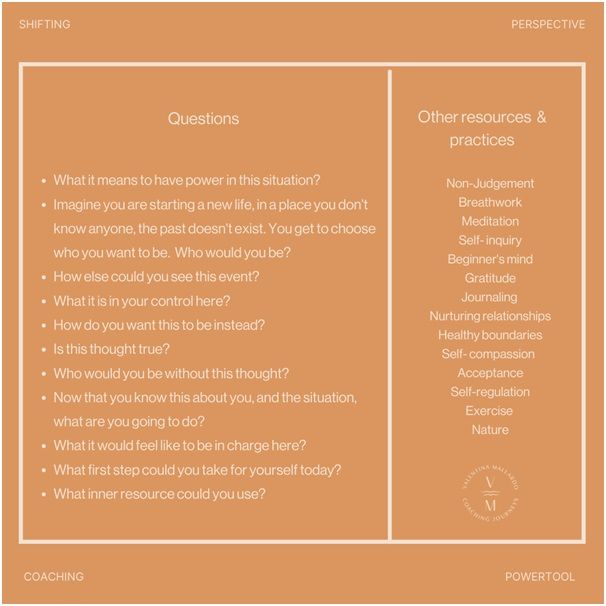A Coaching Power Tool By Valentina Mallardo, Transformational Coach, AUSTRALIA

Victim vs. Creator, Which Voice Do You Choose to Feed?
I often hear two voices, one that comes from a place of blame, self-pity, and fear, the other from self-trust, love, and gratitude. There are days where the voice of self-trustis so powerful that I can barely hear any negative thoughts running through my mind, I have power over my choices, and feel I can do anything. Other days theblaming, fearfulvoice is louder and takes over the loving and trusting one, making me feel a powerless victim of my life circumstances.
Many go through life experiencing “voices” as a negative internal dialogue on who we are and what we do. These voices are always there, waiting for the right opportunity to remind us of how bad we did, what we should have done or said, how not good or smart enough we are, and so on. This inner critic is often referred to as a sub-personality that is typically developed in childhood, and that constantly judges, criticizes, or belittles us. There are many theories ranging from psychoanalytical to neuroscientific studies on the development of this internal negative voice. According to many, its original function was to protect us from danger during childhood, but as adults can prevent us from living at our fullest potential, leading to dysfunctional habits with negative repercussions on our well-being and success. The inner critic or whatever we call it rarely comes alone, in fact, there are often many “voices” populating our minds that have been thoroughly classified and named over the years by researchers and psychologists around the world. I believe valuable work on this has been done by Shirzade Chamine (Founder and CEO of Positive Intelligence Inc.) who says our minds can be our best friend, but also our worst enemy, and they can sabotage us. He refers to saboteurs as internal enemies representing a set of automatic habits of your mind, each with its voice, beliefs, and assumptions that work against your best interest. Find a link in references to find out more about the Saboteurs[I]. In the following pages, I will be talking about one of the most common inner critics – the victim, and how coaching can help clients shift from feeling powerless victims of their circumstances to creators of their reality.
Victim vs. Creator Explanation
The Victim
Online dictionaries refer to a victim[ii]as:
- one that is acted on and usually adversely affected by a force or agent
- a person who has come to feel helpless and passive in the face of misfortune or ill-treatment.
While there is no doubt that there are people in this world who have been or are victims of misfortune, traumatic or life-threatening events, there are also many others who adopt the identity of the victim because of the interpretation they have unconsciously given to something that occurred to them often in childhood and, the “voices” they have been feeding throughout the years to reinforce that interpretation.
Victim’s Common Beliefs:
- Bad things have happened to me in the past and will continue to happen
- People and/or external events are the cause of my suffering and failure
- Even if I try to change it, it won’t work. Things never work for me
People with these beliefs tend to feel powerless, vulnerable, and afraid of the future, as a result, they don’t take the responsibility for their lives by avoiding making choices, procrastinating, and/or making excuses even when there are actions they could take. They also tend to blame others for the misfortune often self-created. While waiting to be rescued by something or someone arriving in their life, they may find comfort in known feelings of self-pity or abandonment and, in all the past stories that have been invisibly and falsely defining who they are. This way of feeling, thinking, and behaving, when repeated over a prolonged period or worst for years, can become a vicious loop that ends up running the show of our lives or part of it, and can strongly influence the lenses through which we see the world and perceive ourselves in it.
Your thoughts and feelings come from your memories. If you think and feel a certain way, you begin to create an attitude. An attitude is a cycle of short-term thoughts and feelings experienced over and over again. Attitudes are shortened states of being. If you string a series of attitudes together, you create a belief. Beliefs are more elongated states of being and tend to become subconscious. When you add beliefs together, you create a perception. Your perceptions have everything to do with the choices you make, the behaviors you exhibit, the relationships you choose, and the realities you create.― Dr. Joe Dispenza, You Are the Placebo: Making Your Mind Matter
Feeding the inner victim through automatic thoughts and behaviors is to give our power away to external people and circumstances in our life. It’s declaring out loud that everything is happening to us, and that the outer world controls the way we think and feel. When we live by these rules, no change can ever happen in our life until we decide to take our power back.
The energy of the mind is the essence of life – Aristotle
The Creator
The word creator comes from to create –“to bring into being” early 15c. from the Latin creatus, past participle of creare “to make, bring forth, produce, procreate, beget, cause”[iii].
A creator is someone who brings things into being, who causes things to happen, someone who generates new opportunities, and who is willing to go past his or her limitations and give birth to something meaningful. A mother giving birth, an artist, a poet, an inventor, a music producer a chef. We are all familiar with these roles as they all bring something tangible or someone into existence. A child, a breathtaking painting, an evolutionary object, a touching piece of music or poem, or a delicious meal.
But What Do Most of These Individuals Have in Common?
Vision,love, desire, vulnerability, courage,presence, self-trust, values,action, commitment.
Creators have something to wake up to in the morning, a vision, a purpose. They are passionate about what they do, and they express themselves, authentically, through their creation. Guided by values and will, they make things happen. They choose, and they take risks. They are vulnerable. They understand that to create means to have the courage to be “seen”, to accept that they could be rejected, to fail. They are not fearless, but they learn to use fear to fuel their creative genius. To do it anyway. They take consistent steps, sometimes baby steps, toward their goals and dreams. They hold dearly that vision in their heart with self-trust and faith. Creators are grateful beings. They celebrate their success in the same way they embrace their failures. They know that patience, setbacks, and repetition are the keys to mastery. Ultimately, they are present with their creation, and with themselves, they intentionally direct their energy toward it. They listen to their intuition; they trust what they know when “they know it”.

How to Shift From Victim vs. Creator
As per the above graphic, the victim can exhibit different things clients may say in a session and recurring patterns throughout the whole relationship. Coaches need to remind themselves that as with other deeply rooted perceptions of self, this shift may require patience, time, and space for clients to be able to see themselves and take steps toward becoming the creator of their reality. Or one, that may not occur at all if they are not willing to embrace change. Coaches support clients in first becoming aware of their disempowering thoughts and behavioral patterns, they do so by asking questions, sharing their insights with no attachment, giving feedback, and, if it feels right, challenging the client’s perspective. Whatever tool the coach is drawn to use, it is vital for the relationship and the client, that coaches show empathy and remain present, free of judgment, curious, and flexible throughout the journey. For clients to open to new ways of thinking and feeling about themselves, coaches need to encourage them to view beyond their “truth”, they also need to be mindful of not rushing to a specific outcome or dictating their perspective or pace in the process. Instead, they invite clients to come up with their way of seeing, being, and doing. This is pivotal in any shift of perspective, but it is even more true and critical when dealing with clients who tend to not take responsibility for their choices and blame others for their failures. Clients’ patterns may indeed and most likely will – present themselves within the relationship with the coach, therefore coaches must understand boundaries and their responsibility in the journey with the client. It’s also relevant to mention that not all clients will be ready for a shift to occur during the coaching relationship, and some may even benefit from other forms of support. A coach’s responsibility is also to discern what is the right thing for the client and let go of any expectations about their destination and the relationship itself.
Helping Clients Embodying the Creator Mindset
There is no magic formula or a set of specific tools to help clients shift their perspective from a victim of outer circumstances to the creator of their world. Coaching tools and techniques need to reflect the client’s unique style, story, and way of being and, what is required at the moment. Along with mirroring, sharing observations with a non-attachment and open heart, giving feedback, and allowing space for silence and self-reflection, there are certainly some questions that may help clients reframe their perspective and look beyond themselves.
Here below are some of the questions coaches could ask, along with external resources and practices which could be suggested or integrated, into blended coaching, for example, to help clients become more present and therefore more aware of their patterns.

We Are Creators
We do not need labels and titles to be in charge of our life.
We are Captains of our boats.
Our own guides and heroes.
We have the power to change what no longer serves us.
We have infinite creative potential within us.
Victim vs. Creator Reflections:
- In which area of your life are you still playing small? How is it making you feel? And what baby steps are you willing to take to change this?
- What being a creator means to you?
- How can you support your clients to trust in their power and be captains of their boats?
- If thoughts can control the trajectory of our lives, what thoughts are you no longer allowing from this moment on? And which ones do you choose to feed instead?
References
[i]Saboteurs
[ii]Victim
[iii]Creator
https://www.psychologytoday.com/
https://www.verywellmind.com/
https://thework.com/
Podcast and Series:
Inspired by the scientific and spiritual teachings of Dr. Joe Dispenza, Bruce H. Lipton, and Eckhart Tolle.
The Heal Podcast – Episode with Bruce H. Lipton The power of our mind and how fear and stress compromise our health
Eckhart Tolle – Essential Teachings Episode Liberation from the mind
Rewired by Dr. Joe Dispenza – on Gaia
Inner Evolution with Dr. Bruce Lipton – on Gaia
www.valentinamallardo.com